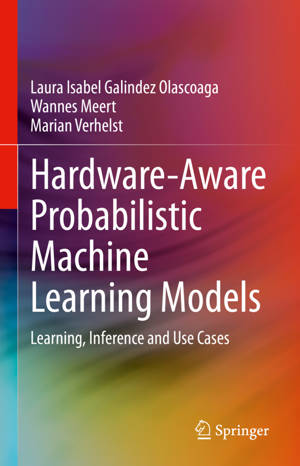
- Afhalen na 1 uur in een winkel met voorraad
- Gratis thuislevering in België vanaf € 30
- Ruim aanbod met 7 miljoen producten
- Afhalen na 1 uur in een winkel met voorraad
- Gratis thuislevering in België vanaf € 30
- Ruim aanbod met 7 miljoen producten
Hardware-Aware Probabilistic Machine Learning Models
Learning, Inference and Use Cases
Laura Isabel Galindez Olascoaga, Wannes Meert, Marian VerhelstOmschrijving
This book proposes probabilistic machine learning models that represent the hardware properties of the device hosting them. These models can be used to evaluate the impact that a specific device configuration may have on resource consumption and performance of the machine learning task, with the overarching goal of balancing the two optimally.
The book first motivates extreme-edge computing in the context of the Internet of Things (IoT) paradigm. Then, it briefly reviews the steps involved in the execution of a machine learning task and identifies the implications associated with implementing this type of workload in resource-constrained devices. The core of this book focuses on augmenting and exploiting the properties of Bayesian Networks and Probabilistic Circuits in order to endow them with hardware-awareness. The proposed models can encode the properties of various device sub-systems that are typically not considered by other resource-aware strategies, bringing about resource-saving opportunities that traditional approaches fail to uncover.
The performance of the proposed models and strategies is empirically evaluated for several use cases. All of the considered examples show the potential of attaining significant resource-saving opportunities with minimal accuracy losses at application time. Overall, this book constitutes a novel approach to hardware-algorithm co-optimization that further bridges the fields of Machine Learning and Electrical Engineering.
Specificaties
Betrokkenen
- Auteur(s):
- Uitgeverij:
Inhoud
- Aantal bladzijden:
- 163
- Taal:
- Engels
Eigenschappen
- Productcode (EAN):
- 9783030740412
- Verschijningsdatum:
- 20/05/2021
- Uitvoering:
- Hardcover
- Formaat:
- Genaaid
- Afmetingen:
- 156 mm x 234 mm
- Gewicht:
- 426 g

Alleen bij Standaard Boekhandel
Beoordelingen
We publiceren alleen reviews die voldoen aan de voorwaarden voor reviews. Bekijk onze voorwaarden voor reviews.











